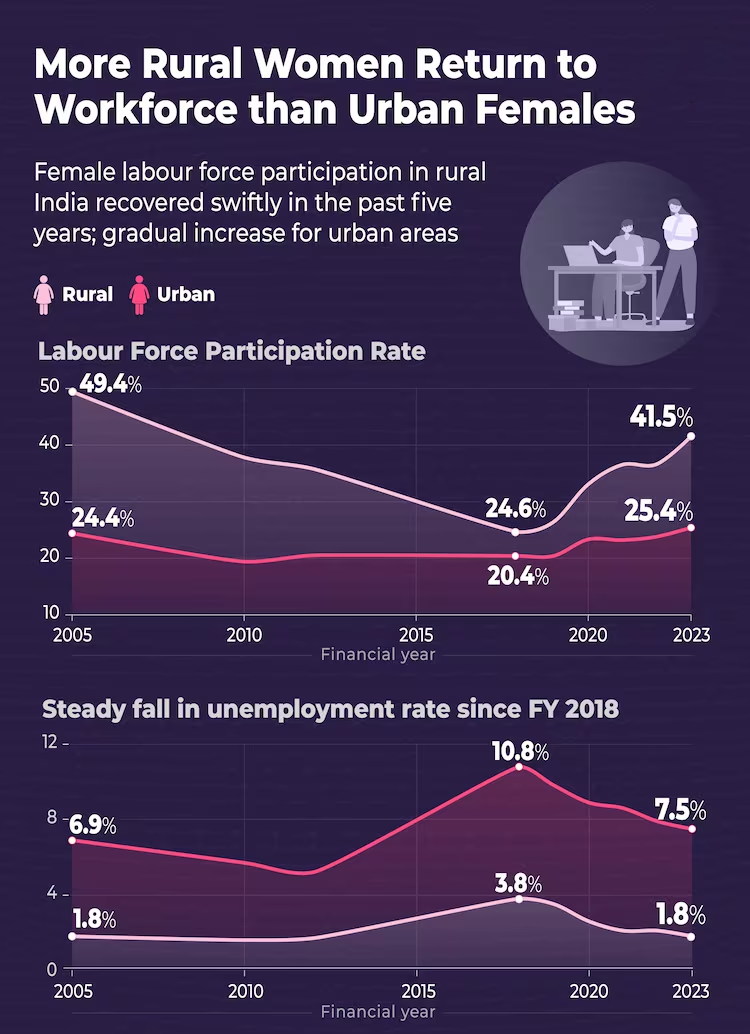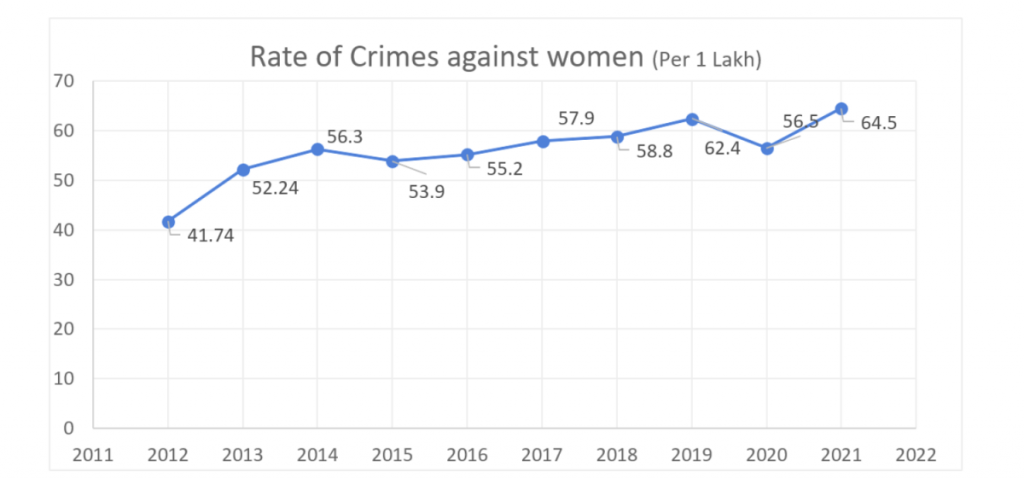Governance
Enact WUEGA: Women’s Urban Employment Guarantee Act
- 06 Mar 2024
- 15 min read
This editorial is based on “A women’s urban employment guarantee act” which was published in The Hindu on 04/03/2024. This article explores the possibility of a national Women’s Urban Employment Guarantee Act (WUEGA).
For Prelims: Mahatma Gandhi National Rural Employment Guarantee Act(MGNREGA), Unemployment rate, Periodic Labour Force Survey (PLFS), Ayyankali Urban Employment Guarantee Scheme (AUEGS), Mukhya Mantri Shahri Ajeevika Guarantee Yojna, Deendayal Antyodaya Yojana-National Urban Livelihoods Mission (DAY-NULM), PM Street Vendor’s AtmaNirbhar Nidhi (PM SVANidhi)
For Mains: Women’s Urban Employment Guarantee Act (WUEGA) - Necessity and Potential Challenges.
The Mahatma Gandhi National Rural Employment Guarantee Act (MGNREGA) has been instrumental in providing financial autonomy to women in rural areas by guaranteeing at least 100 days of wage employment per year for unskilled manual work. However, urban realities are different.
The unemployment rate in urban areas is higher than in rural areas, indicating a high unmet demand for employment among urban women. Thus, there is a proposal for a national Women’s Urban Employment Guarantee Act (WUEGA) to address the challenges of urban unemployment among women in India.
What is the Proposed Women's Urban Employment Guarantee Act (WUEGA)?
- About: The Women’s Urban Employment Guarantee Act (WUEGA) is a proposed legislation aimed at addressing urban unemployment specifically for women. It purposely guarantees employment opportunities specifically for urban women.
- Objective: WUEGA will aim to bridge the gap in employment opportunities between men and women in cities. By providing a safety net and income security, WUEGA will seek to empower women and encourage their participation in the urban workforce.
- Possible Features:
- Guaranteed Employment: WUEGA proposes guaranteeing women a minimum number of workdays (e.g., 150 days) per year.
- Local Work: Creating work opportunities within a reasonable distance (e.g., 5 km) from a woman's residence.
- Accessible Infrastructure: WUEGA might include provisions for essential facilities like childcare centres at worksites to address challenges faced by working mothers.
- Skill Development: The proposal might incorporate training programs to bridge any skill gaps between available jobs and the qualifications of women in the applicant pool.
- Women-Led Management: It proposes that women should form a significant percentage of the WUEGA management staff; at least 50% (ideally 100%) of the program management staff under WUEGA.
- Supportive Measures: Incentives such as automatic inclusion in welfare boards can be created; these could act as agencies to provide maternity entitlements, pensions, and serve as resources for emergency funds.
What is the Necessity for the Women’s Urban Employment Guarantee Act (WUEGA)?
- Gender Disparities in Urban Employment:
- Urban areas often witness gender-based disparities in employment opportunities. According to the Periodic Labour Force Survey (PLFS), only 22.9% of urban women were employed in the last quarter of 2023.
- An estimate of the number of women in urban areas in the age group of 15-59 who are out of the workforce is 10.18 crore.
- The existing urban employment schemes do not adequately address these specific challenges faced by women.
- Urban areas often witness gender-based disparities in employment opportunities. According to the Periodic Labour Force Survey (PLFS), only 22.9% of urban women were employed in the last quarter of 2023.
- Economic Empowerment and Sustainable Development Goals:
- WUEGA would empower urban women by providing them with guaranteed employment opportunities. By ensuring a minimum number of workdays, it enables women to contribute to their households and communities.
- Promoting women's employment is crucial for achieving sustainable development goals, including gender equality and economic empowerment.
- Childcare and Supportive Infrastructure:
- Despite higher education levels among urban women, their participation in the workforce remains low due to various factors such as social norms, safety concerns, and limited access to transportation.
- WUEGA emphasises the need for childcare facilities at worksites. These provisions enable women to participate in employment without compromising their caregiving responsibilities.
- Drawing lessons from Successful Rural Employment Schemes:
- Drawing lessons from successful rural employment schemes like the MGNREGA, the WUEGA can replicate similar models tailored for urban contexts.
- By leveraging existing frameworks and experiences, the WUEGA can build upon proven strategies for enhancing women's participation in the workforce.
- Potential for Economic Growth and Development:
- Increasing women's employment rates can serve as a catalyst for economic growth by expanding the labor force and stimulating productivity.
- The WUEGA has the potential to contribute to broader economic development goals by harnessing the talents and capabilities of urban women.
What are the Potential Challenges in Enacting the Women’s Urban Employment Guarantee Act (WUEGA)?
- Financial Burden:
- Providing guaranteed employment translates to significant costs for wages, infrastructure development (e.g., childcare facilities at worksites), and program administration.
- Assuming 150 days of work per year at ₹500 as daily wages, the wage component, to be funded by the Union government, would cost around 1.5% of the GDP.
- Job Creation in Locality:
- Creating enough diverse work opportunities within a reasonable distance (e.g., 5 km) from a woman's residence, especially in densely populated cities, could be challenging.
- The program will need to consider local needs and infrastructure to design suitable work options.
- Safety Concerns:
- Safety remains a significant concern for women in urban settings, particularly during commutes to and from work.
- Fear of harassment or violence in public spaces may discourage women from seeking employment opportunities, thus limiting their participation in the workforce.
- The rate of crimes against women per lakh population stood at 66.4 while the charge sheeting in such cases was logged at 75.8, according to the data in “Crime in India 2022”, the annual crime report of the NCRB.
- Skill Gaps:
- Many urban women may lack the necessary skills and experience required for formal employment opportunities.
- Access to quality education and vocational training programs may be limited, leading to disparities in skill levels and hindering women's employability.
- Capacity Building:
- Ensuring at least 50% women in program management at all levels could be difficult initially.
- Focused capacity-building initiatives might be required to create a robust female workforce for managing the program.
- Legal and Bureaucratic Barriers:
- Efficient program implementation requires a streamlined bureaucracy to handle registration, job allocation, grievance redressal, and monitoring.
- There may be opposition from individuals or groups who are resistant to change and advocate for maintaining the status quo, which could impede the passage of legislation aimed at enhancing women's employment rights.
- Social Norms and Gender Stereotypes:
- Deep-rooted societal expectations may hinder acceptance of women's increased participation in the workforce, especially in urban areas where traditional gender roles are more pronounced.
- Prevailing stereotypes regarding women's roles as caregivers or homemakers could pose resistance to their engagement in formal employment.
What are the Government Initiatives for Urban Employment in India?
- Central Govt:
- State Govts:
- Kerala was among the first states to provide 100 person-days of guaranteed wage employment through the Ayyankali Urban Employment Guarantee Scheme (AUEGS)—which was launched in 2011. The scheme guidelines require ULBs in Kerala to prioritise women, such that they comprise at least 50% of the beneficiaries under the scheme.
- Himachal Pradesh’s Mukhya Mantri Shahri Ajeevika Guarantee Yojna was launched in 2020 to enhance livelihood security in urban areas by providing 120 days of guaranteed wage employment to every household in a financial year.
- Jharkhand: Mukhyamantri Shramik Yojana was launched in 2020 to enhance livelihood security in Jharkhand State by providing guaranteed 100-day wage employment in a financial year.
What Should be the Way Forward For Effective Enactment of WUEGA?
- Collecting Gender-Disaggregated Data:
- Gender-disaggregated data provides policymakers with valuable insights into the specific challenges faced by urban women in accessing and retaining employment.
- The collected data should note trends regarding choice of jobs, usual times of the year when women access these jobs, education levels of women opting for the scheme, and so on.
- Designing an Urban Employment Scheme with a Gender Lens:
- Draft the Women's Urban Employment Guarantee Act (WUEGA) as an all-encompassing legislation, delineating the rights, privileges, and responsibilities of both the government and recipients, grounded in gender-disaggregated data.
- The legislation should mandate equal pay for equal work, ensuring that women receive the same wages as their male counterparts for similar job roles and responsibilities.
- Allocate Resource and Build Capacity:
- Allocate adequate financial resources for the implementation of WUEGA, ensuring sufficient funding for wages, administrative expenses, infrastructure development, and capacity-building initiatives.
- Provide training and capacity-building programs for government officials, program administrators, and beneficiaries to ensure effective implementation and management of the WUEGA.
- A Phased Approach to Implementation:
- Initiate pilot programs in select urban areas to test the feasibility of implementing WUEGA. Conduct feasibility studies to assess the readiness of different urban areas and identify potential challenges and opportunities.
- Begin implementation of WUEGA in a phased manner, starting with urban areas where infrastructure and support systems are relatively well-developed and expanding gradually to other areas.
- Track the Implementation Progress:
- Establish robust monitoring and evaluation mechanisms to track the implementation progress, assess program effectiveness, and identify areas for improvement, with a focus on outcomes such as employment generation, income enhancement, and skill development.
- Address Safety Concerns:
- Implement measures to enhance the safety and security of women in public spaces, including adequate lighting, surveillance systems, and increased police patrolling, to mitigate safety concerns and encourage greater workforce participation.
- Support Women Entrepreneurs :
- Provide support and incentives for women entrepreneurs to start and grow their businesses, including access to financial resources, mentorship programs, and networking opportunities, to create alternative avenues for employment and economic empowerment.
- Partnerships and Collaboration:
- Forge partnerships with civil society organisations, community groups, private sector stakeholders, and international agencies to leverage their expertise, resources, and networks for the successful implementation of WUEGA.
- Raise Awareness and Change Attitudes:
- Conduct awareness campaigns and sensitisation programs to challenge gender stereotypes, promote gender equality, and change societal attitudes toward women's roles and capabilities in the workforce.
Conclusion
The Constitution of India upholds principles of equality and social justice, requiring affirmative action to tackle gender disparities in employment. Implementing the WUEGA is in line with these constitutional mandates and ethical obligations to promote gender equality and empowerment.
| Drishti Mains Question:
Examine the necessity and potential obstacles in enacting the Women’s Urban Employment Guarantee Act in India. Propose strategies for achieving effective economic empowerment for women in the country. |
UPSC Civil Services Examination, Previous Year Questions (PYQs)
Prelims:
Q. How does the National Rural Livelihood Mission seek to improve livelihood options of rural poor? (2012)
- By setting up a large number of new manufacturing industries and agribusiness centres in rural areas.
- By strengthening ‘self-help groups’ and providing skill development.
- By supplying seeds, fertilisers, diesel pump sets and micro-irrigation equipment free of cost to farmers.
Select the correct answer using the codes given below:
(a) 1 and 2 only
(b) 2 only
(c) 1 and 3 only
(d) 1, 2 and 3
Ans: B
Mains:
Q. Examine the role of ‘Gig Economy’ in the process of empowerment of women in India. (2021)






